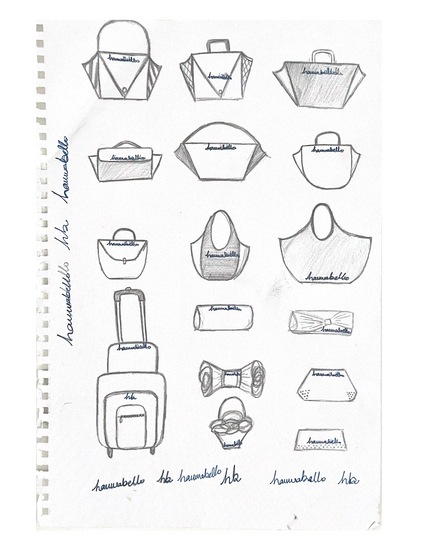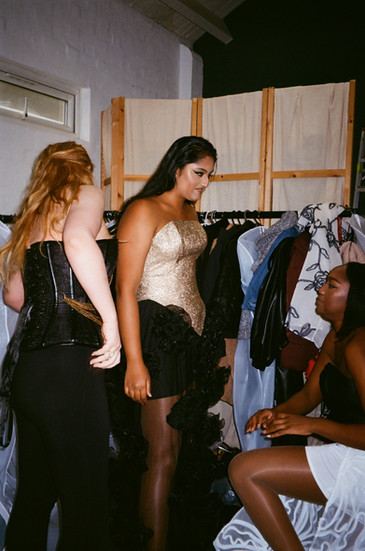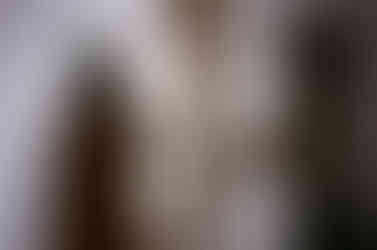A Love Letter: ROSES AND THORNS
- UNL

- Feb 11, 2024
- 12 min read
Updated: Jun 10, 2024
Hauwa Bello is the womenswear designer who actualised and debuted her clothing line, EveBello, at New York Fashion Week in under three months. In just 79 days, boarding 30 flights between the UK and craftsmen, Hauwa launched EveBello in New York City on February 10, 2024.
The concept of sharing Hauwa’s journey emerged during the inaugural editorial shoot in London for Roses and Thorns, EveBello's first collection. Hauwa asked me to capture behind-the-scenes and while I knew it would be impressive, the energy in the room surpassed all expectations. There was an infectious sense of love among the thirteen friends she gathered as we witnessed Hauwa’s dedication. Despite only two hours of sleep, Hauwa managed to cook for everyone in the room before the shoot. I could never understand how she operated, but it became clear it wasn't just her work ethic but her caring deeply for those around her.
-Babajide Osikoya
TRIGGER WARNING: This interview contains discussions of sexual assault. If you or someone you know is experiencing distress related to sexual assault, please know there are resources available to help.

Tanasia Najaé: Where did the idea for Roses and Thorns originate?
Hauwa Bello: Roses to me are this delicate, beautiful flower that represents love and fragility. Roses have thorns that protect them from the wild. To be able to fully appreciate a rose and all of its beauty, you’ve got to snip the thorns off so you don’t bleed. To me, roses represent a woman’s strength.
They’re my ode to sexual assault. It happened to me quite frequently from the age of 14 to 18. That's the only experience I knew and I was always so confused as to why it would happen. It made me think: what was it about me that made them do this to me? At the time, I thought I was skinny and unattractive. I assumed my fragility was what made people think that it was okay to take advantage of me. No matter how much I tried to fight back, it was almost like the thorns were being snipped off.
TN: I'm so sorry you went through that.
I love that you’ve taken that experience and turned it into something so beautiful. You’ve taken your power back. Your fragility is your strength.
HB: Exactly.
TN: You also draw, would you say that your drawings cultivated your vision for Roses and Thorns?
I started drawing comics and over time, my love for fashion and drawing grew because that was the only way I felt I could express myself. When I looked back on my drawings, I noticed there was always a sharp edge to everything I drew.
Hauwa's drawings at age 15
My fashion journey began with me wanting to create body armour, symbolic of the war between me and the world. I walked around with a mask, trying to protect myself from everyone. This collection is about me creating that defence for myself and fighting back. All of those sharp edges were my protection.
TN: To see fashion as a way of protecting yourself is so interesting. For so many people among so many different cultures, it is protection.
I wonder how you feel now that you’ve revealed your collection. Has it been a release for you or do you feel that it’s brought back emotions that you wished to bury?
HB: I had moments where I felt stuck. Now that I've begun creating, it's such a release. It's a burst of emotion to be able to say to myself: I don't have the imposter syndrome as badly as I thought I did. I'm able to do what I've always dreamt of. Regardless of my past, my life is beautiful. I’m exactly who I wanted to be, who I’ve always been.
I've had the opportunity to see a reward for pain and to build a collection that is dedicated to the source of the pain. Being able to see, touch, feel and have people wear and understand my story makes me feel heard.

Growing up, I always felt unheard. People rarely understand that I'm a fully functioning human who often excels but still experiences pain. Everyone says, “You don’t look like or act like it.” But, that doesn't change the fact that it happened and what happened changed me. Being able to now tell my own story is incredible for me. It's therapy outside of therapy.
TN: Everyone wants to be heard. But, sometimes that validation isn’t coming and we must learn to validate ourselves. To say, if the world can’t hear me, I hear me. If the world refuses to see me, I see me. With such a story as yours, are you anxious about how people are going to receive it?
HB: The opinions of people are something I didn't realise I was going to be nervous about until I saw people in my collection. After we did the first photo shoot, I cried for two days straight. Everyone was so excited, but I didn't like anything. The imposter syndrome set in and I ended up scrapping half the things from the first photoshoot. It didn’t feel like I told my story.
I’m realising that the anxiousness I feel is going to come with the territory because the world craves misunderstanding people. I’m trying to remove the power that other people’s validation has had on me. I’ve begun to give that validation to myself. If you tell me I'm pretty I respond with, “I know”.
I'm open to constructive criticism and I'm open to suggestions. But, when my story is being told so clearly with each of my pieces, anyone choosing to misunderstand me is their problem. As long as I'm happy with the collection and the story being told, no one has the power to oppress me.
TN: The more you speak about Roses and Thorns, the more it sounds like a love letter to not only the you that exists right now but to the younger you as well.
HB: Yeah, it is a love letter.
I didn't have the self-love to openly say, this happened to me but I’m still worthy of love. Loving myself and not letting others negatively affect what I create has been a continuous journey.
TN: I believe honouring who we are and what we choose to create is the ultimate form of self-love.
HB: I've always felt like I wasn't creative, even though all I do is create. When I worked in IT or was on the path to becoming a chemical engineer, I always had a creative way of doing it. I’m creative even in the ways that I learn. I don't write, I draw. I don't read, I listen.
TN: I've been learning to be still and listen. Tune out the noise and just listen. It creates space for me to create.
HB: I’m creating space for myself. It’s me against the world.
A lot of people define love in different ways. I'm redefining self-love as being proud of myself. For someone who's only physically done this since November 2023, I'm super proud of myself. This is more than validation, money or recognition. Those things will come. It's not even a 'may' come, it will come because I know I'm good at what I do.
TN: You said this collection is more for you than it is for anyone else. Do you want people who’ve had similar experiences to connect with your story and your collection or is that not even a thought of yours?
HB: It’s definitely a thought for me. Later in life, I found out that some of the people who did things to me did it to my friends too but we never spoke about it. There’s power in speaking about it.
I disregarded so many other ways to enter the fashion industry. I was a fashion buyer a decade ago, I could have gone through retail. I could have found an easier way in, but I wanted to do it by telling my story. I hope anyone who wears my collection feels the same strength I do now.
TN: As a woman who also knows so many other women who’ve experienced sexual assault, I think what you’re doing is so powerful and shows so much of your strength. It gives me strength.
HB: I’m glad.
I desire for women to be able to tell their stories and drown out their oppressors. Oppressors are not just men, it’s the world. I want women to be able to show who they are, unfiltered, without the risk of being judged. I want women to know that no matter who you are, you can do anything because I have done anything. I have done everything.
I want people to talk more about rape culture and how coercion exists. Even when I thought sex was consensual, it wasn't. So, it took a lot of strength for me to tell my story.
By putting my story out there, I’m able to tell women that it's ok to not know how to say no. I didn't know how to say no. People always say, why didn't you just run, or do this or do that? I used to think of myself as the dumbest victim ever because I didn't do everything in my power to walk away from what was happening. But, I was frozen. I would shut down and say, ‘Please do whatever you want to do but please use protection.’ Some women have experienced or are experiencing the same thing, but they still count. I just want them to know that.
I don't have the desire to be the girl that was raped. This story doesn't need to be attached to my face, name or label, but it gives me strength not to hide.
TN: Why was it important for you to create your collection in such a specific timeframe? Why now?
HB: I had a tough breakup quite recently. Ever since, my life has been so different. Everyone a part of this journey are new friends who have been so eager and able to support me. As soon as I thought about the idea, I realised it was doable because I have a community of creative people who can help me. The community around me made me feel like it was doable in four weeks. It took me eight weeks, but they made me feel like it was doable in four. I asked myself, why wait? The time is now. There's no reason to wait.
TN: How important is community to you?
HB: Very. On the day of the photoshoot, I looked around and said one day I'd love to be able to hire everyone in this room to work with me forever. That way, I'd never have to explain who I am or what my vision is.

I want everyone around me to feel like they've got creative control. I want them to be able to freely express themselves. I told my models that there's no clear definition of what a woman is; just be yourself. I told them my vision and let them recreate it in a way that they saw fit.
My photographer wondered why I had no critiques about the photos. The only thing I wanted was for the background to be white. I didn’t want anyone’s faces retouched because they're all beautiful. I wanted everyone to see who they are. I don't believe in imperfections because I think we're already perfect. My idea of community is everyone having the space to be exactly who they are, flaws and all.
TN: While looking at this collection, I was curious as to why you chose to include roses in such a deliberate way. One of your pieces from the collection highlights roses in the bosom area. What is the importance of that?
HB: To be honest, that dress was initially made for me. The model was more slim so there was a lot more room in the bust area. I wanted to fill that space and the roses just happened to work perfectly. The reason for this dress specifically is the skin tone - to emphasise the nudity and fragility of a rose.
TN: Well, it's cool and it worked.
Why did you opt for black, white, neutral and metallic as your colour palette?
HB: Roses are usually red and white, so I knew I'd somehow incorporate those colours.
Gold is something that's always felt good for me. I don't like to wear a lot of gold on my clothes, and I think a lot of people would feel the same. So, I used this as an opportunity to be bold and express a sense of boldness that people don't often do with clothing. Regarding the colour black, it just so happens that it is an amazing colour and works with everyone's skin tone.
I needed to make the fabrics for my collection. I wanted to be involved in the entire process - from start to finish - as opposed to seeing the initial design and then the final product. The majority of my initial samples were black and, as time went on, I incorporated more colour.


In regards to the metallic, reflective background, there wasn't much thought that went into it. I knew that the main thing I wanted to do was play with texture to emphasise the thorny nature of the roses and their bloom effect.
Most of the collection that anyone has seen is incomplete because I've still got a whole other hand-stitching session. I still have so many more clothes being made, but I wanted to have something for the advertisement side of things.
One of the pieces that somewhat resembles body armour reads, "I'm going to kill you" basically. In other words, you can look but don't touch - sort of like a rose.
TN: I love that you mentioned there was no particular reason for your metallic background or the placement of the roses. So much of our creative processes are about listening to our instincts and trusting in our vision. Just like roses, it’s about honouring both the beauty and the thorns. They both come together to create something unique and appealing.
HB: Exactly. You get it.
TN: Talk to me about your relationship with fashion. I love clothes but, for me, it's not just about the clothes and how they look. Fashion is emotional. Anything I wear has to evoke a certain kind of emotion or else I don't wear it. Often, getting dressed is so chaotic for me. It involves so much putting on and taking off. How about you?
HB: I'm pretty much that on paper. However, I find that with clothes, there's always got to be this "Don't talk to me", protective layer. When I get dressed, I'm almost always in heels. Sometimes it's a good thing. Sometimes it's not such a good thing because it means I'm unapproachable in situations where I want to be approached.
Clothes for me are like a warm hug for my younger self. If it doesn't feel right, I'm not even stepping out of the house.

I'm also one of those people that gets everything delivered. You would have to beg me to come out of the house if I'm not able to do a full glam. Unless it's for the airport, I am almost always overdressed, a serial over-dresser because it just needs to feel right. I've got to have the right shoes or the right dress. I'm trying to change that narrative at the moment. I decided to sell out my entire closet, and I'm only going to keep my suits.
I'm allowing myself a lot of colour, but I'm removing the pressure and the power I gave clothing as an amour. I wear the same suit every day in a different colour with something neutral on the inside. I've also made some custom-made shirts with my initials on them to remove the pressure and the chaoticness of dressing up. I know I look good in a suit so it makes every day so much easier for me.
TN: That's so interesting because I've had the same realisation myself. I've been recently developing a “uniform”. There's so much pressure attached to how we look. Now, as long as I have something functional and good quality, I’m happy.
HB: Funny enough, when I began recording my day-to-day journey, I looked back at videos and noticed that I was naturally wearing suits every day. It was just so much easier.
Whenever I travel, I take the same few suits and get them dry-cleaned. In doing that, I realised I've also removed the pressure of doing consistent laundry. Over time, I began removing anything out of the equation that takes up too much of my time and doesn’t contribute to the self-love journey I’m on. Cooking included.
Dressing up used to be such a big part of my day. I would go to sleep dreaming about what piece I was going to wear the next day and how dramatic it was going to be. Towards the end of the year, I ended up with 1,000 pieces and half of them still had the tags on them.
I realised that maybe it’s time I make some changes…
TN: It seems like you’re going through such a transformative period of your life. What other changes do you hope to see in the future?
HB: I've changed so much, but regardless of how much I achieve or how much strength I may acquire, I still don’t know how to enter the dating world because I'm scared of men.
I was invited out to a party recently and was the instigator of a lot of people getting drunk that night. A girl I’d just met at the party got blackout drunk. I didn’t know her before that night but I found myself sitting down by the bedside where she passed out, operating as her security until her friends came to get her.
I didn’t assume anyone at the party would hurt any of us, but nobody knows rapists. Nobody knows assaulters. But, they’re our brothers and our sisters. They’re our neighbours and our teachers. We must be mindful of that and protect not only ourselves but everyone, men included. That’s the change I want to see.
Going through this creative process, I find myself being more open about what happened to me in the hopes of helping someone else. I’m not perfect just yet, but I’m changing the narrative.
Hauwa's next show is at London Stadium on Feb 17, 2024. You can grab tickets here.

CREDITS:
Story: Hauwa Bello
Interviewer: Tanasia Najaé
Photography: Babajide Osikoya
























































































Comments